Related Research Articles

Heathrow Express is a high-frequency airport rail link operating between London Heathrow Airport and London Paddington. It is an open-access operator, formed in 1998, and is operated jointly by Great Western Railway & Heathrow Express Operating Company, a wholly owned subsidiary of Heathrow Airport Holdings.

Freightliner Group is a rail freight and logistics company, formed in the United Kingdom in 1995, and now having expanded into, The Netherlands and Poland. Freightliner Limited is the largest intermodal freight transport operator in the United Kingdom and the second largest freight operating company in the country by revenue, behind DB Cargo UK. It is a subsidiary of Genesee & Wyoming.

The British Rail Class 57 is a type of diesel locomotive that was remanufactured from Class 47s by Brush Traction of Loughborough between 1998 and 2004. The locomotives were fitted with re-conditioned EMD engines and the same model of traction alternator as that fitted to the Class 56.

The British Rail Class 89 is a prototype electric locomotive. Only one was built, in 1986, by British Rail Engineering Limited's Crewe Works. It was used on test-trains on both the West Coast and East Coast Main Lines. The locomotive was fitted with advanced power control systems and developed more than 6,000 bhp. After being withdrawn in 1992, it was returned to service in 1996, before being again withdrawn in 2000. As of January 2021, it is in the final stages of an overhaul that will return it to the main line.

The British Rail Class 40 is a type of British railway diesel electric locomotive. A total of 200 were built by English Electric between 1958 and 1962. They were numbered D200-D399. They were, for a time, the pride of British Rail’s early diesel fleet. However, despite their initial success, by the time the last examples were entering service they were already being replaced on some top-level duties by more powerful locomotives. As they were slowly relegated from express passenger uses, the type found work on secondary passenger and freight services where they worked for many years. The final locomotives ended regular service in 1985. The locomotives were commonly known as "Whistlers" because of the distinctive noise made by their turbochargers.

The British Rail Class 73 is a British electro-diesel locomotive. The type is unusual in that it can operate from the Southern Region's 650/750 V DC third-rail or an on-board diesel engine to allow it to operate on non-electrified routes. This makes it very versatile, although the diesel engine produces less power than is available from the third-rail supply so the locomotives are rarely operated outside of the former Southern Region of British Rail. Following the withdrawal and scrapping of the more powerful Class 74 electro-diesels in 1977, the Class 73 was unique on the British railway network until the introduction of the Class 88 electro-diesels in 2017. Ten locomotives have been scrapped.

The Class 66 is a type of six-axle diesel-electric freight locomotive developed in part from the Class 59, for use on the railways of the UK. Since its introduction the class has been successful and has been sold to British and other European railway companies. In Continental Europe it is marketed as the EMD Class 66 (JT42CWR).

Railfreight Distribution was a sub-sector of British Rail, created by the division in 1987 of British Rail's previous Railfreight sector. It was responsible for non-trainload freight operations, as well as Freightliner and Intermodal services. In its early years, the division was occasionally referred to as Speedlink Distribution. It was later responsible for freight operations through the Channel Tunnel.

The British Rail Class 37 is a diesel-electric locomotive. Also known as the English Electric Type 3, the class was ordered as part of the British Rail modernisation plan. They were numbered in two series, D6600–D6608 and D6700–D6999.

The British Rail Class 20, otherwise known as an English Electric Type 1, is a class of diesel-electric locomotive. In total, 228 locomotives in the class were built by English Electric between 1957 and 1968, the large number being in part because of the failure of other early designs in the same power range to provide reliable locomotives.

The TGV Atlantique (TGV-A) is a class of high-speed trains used in France by SNCF; they were built by Alstom between 1988 and 1992, and were the second generation of TGV trains, following on from the TGV Sud-Est.
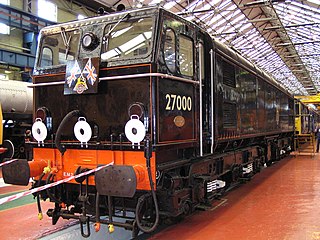
The British Rail Class 77, also known as Class EM2, is a class of 1.5 kV DC, Co-Co electric locomotive. They were built by Metropolitan-Vickers in 1953–1954 for use over the Woodhead Line between Manchester and Sheffield.
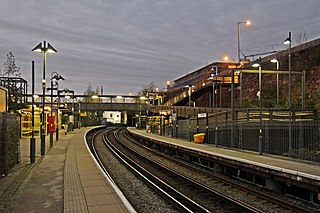
Brunswick railway station serves the Toxteth district of Liverpool, England, on the Northern Line of the Merseyrail network. The station serves the nearby district of Dingle and is situated on a short section of track between two tunnels, between the now in-filled Toxteth and Harrington Docks. The station also serves businesses on the Brunswick Dock estate. The residential area of Grafton Street is reached by steps or ramp from the southbound platform.

Crewe Electric TMD is a traction maintenance depot for AC electric and diesel-electric locomotives. It is situated to the north-west of Crewe railway station on the Crewe to Chester railway line, opposite Crewe Works. Road access is from Wistaston Road and the depot is operated by DB Cargo UK.

Neville Hill is a railway Train Maintenance Depot in Osmondthorpe, Leeds, England on the Leeds to Selby Line. The depot is situated 2 miles 14 chains (3.5 km) to the east of Leeds railway station on the north side of the line.
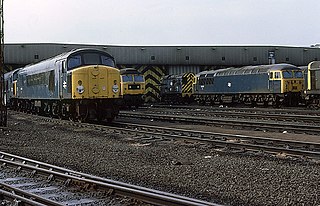
Toton Traction Maintenance Depot or Toton Sidings is a large Traction Maintenance Depot located in Toton, Nottinghamshire. The TOPS depot code for the depot is TO. Before TOPS, the shed code was 16A.
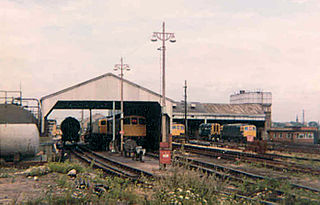
Hither Green (London) Traction Maintenance Depot or Hither Green (London) TMD is a railway depot used for the maintenance and servicing of freight trains adjacent to the Hither Green marshalling yard. The depot is a hub for moving freight around southeast England. Hither Green TMD is owned and operated by DBS. The official depot code is HG. In steam days the shed code was 73C.

The Série 1800 was a class of 10 diesel-electric locomotives built for the Portuguese Railways (CP) in 1968. Designed and engineered by English Electric, they were closely modelled on the British Rail Class 50 locomotives but built for CP's 1,668 mmIberian gauge and larger loading gauge than possible in Great Britain.
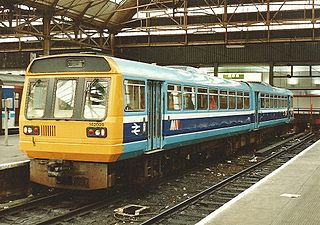
Network NorthWest was a brand name of British Rail which was applied for a short period to the provincial railway network in North West England. It was launched in 1989 during British Rail's sectorisation programme which created distinct brand identities for regional sub-divisions.

The ScotRail trading name was adopted on 22 September 1983, under manager Chris Green, British Railways Scottish Region to provide a distinctive brand for the British Rail network in Scotland.
References
- ↑ "Breaking up is not hard to do". The Herald. 16 February 1994. Retrieved 10 November 2020.
- ↑ MC Metals Rail issue 171 1 April 1992 pages 26-29
- ↑ MC Metals Rail issue 172 15 April 1992 pages 34-36
- ↑ "D8098". Great Central Railway. Retrieved 10 November 2020.
- ↑ "D5301, Class 26 (BRCW)". Lakeside and Haverthwaite Railway. Design Work. Retrieved 4 March 2013.
- ↑ "59575 Class 111 Trailer Second Buffet Lavatory". The Railcar Association. Retrieved 10 November 2020.
- ↑ Butcher, Shannon. "DERBY TRAINMAN: '45' NOT OUT". Rail Express . Mortons Media Group Ltd. Retrieved 21 January 2020.